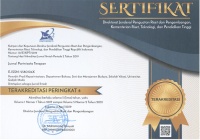Unsur Budaya dan Arsitektur Tradisional sebagai Potensi Daya Tarik Wisata di Desa Wisata Pengotan Kabupaten Bangli
Hendra Putrawan(1*), I G Agung Diasana Putra(2)
(1) Universitas Udayana
(2) Universitas Udaya
(*) Corresponding Author
Abstract
Cultural and architectural elements are very important to be used as attraction in a Tourism Village. One example of a village that utilizes this potential as a tourist attraction is Pengotan Tourism Village. Pengotan Tourism Village was chosen in this study because of the existence of cultural and architectural elements that are still thick and need to be preserved. There are various traditions that characterize Pengotan Tourism Village that do not exist anywhere else. In terms of architecture, Pengotan Tourism Village still applies the concept of traditional architecture which is directly related to the natural resources that are owned around the village and the pattern of activities of its inhabitants is still influenced by their outlook on life. There are interesting things about the architecture of the Pengotan Tourism Village settlement, which on the one hand shows the diversity of its architecture and on the other hand it still shows consistency in the form and layout of the building. In this study, the things that want to be studied are what traditions are used as tourist attractions in Pengotan Tourism Village and how is the architecture of Pengotan Tourism Village settlements.
Keywords
Full Text:
PDFReferences
Gelebet, I Nyoman, dkk.(1986). Arsitektur Tradisional Daerah Bali. Denpasar : Departemen Pendidikan dan Kebudayaan Proyek Inventarisasi dan Dokumentasi Kebudayaan Daerah.
Geriya, Wayan.(1995). Pariwisata dan Dinamika Kebudayaan Lokal, Nasional, Global. Denpasar : Upada Sastra.
Maharini, D.A Eka dan Sukma Arida. (2014). Keterlibatan Masyarakat Dalam Mengelola Desa Wisata Pangsan Di Kabupaten Badung, Jurnal Destinasi Pariwisata, Vol. 2 No. 1.
Marpaung, H. 2002. “Pengetahuan Kepariwisataan”. Bandung : Alfa Beta.
Moleong, Lexy J.(2012). Metodologi Penelitian Kualitatif. Bandung : PT. Remaja Rosdakarya.
Oliver, P. (1997). Encyclopedia of Vernacular Architecture of The World. Cambridge: Cambridge University Press.
Oliver, P. (2006). Built to Meet Needs. Cultural Issues in Vernacular Architecture. Amsterdam: Architectural Press.
Pendit, Nyoman S. 1999. Ilmu Pariwisata. PT. Pradya Pratama. Jakarta.
Pitana M.Sc, Prof. DR. I Gde. Pengantar Ilmu Pariwisata.(2009). Yogyakarta : Andi Offset.
Pujaastawa, dkk.. 2005. “Pariwisata Terpadu : Alternatif Model Pengembangan Pariwisata Bali Tengah”. Denpasar : Universita Udayana.
Putra, Darma dan I Gde Pitana.(2010). Pariwisata Pro-Rakyat. Jakarta : Kementrian Kebudayaan dan Pariwisata.
Rapoport, A. (1990). History and Precedent in Environmental Design. New York: Plenum Press.
Rapoport, Amos.(1969). House Form and Culture. Englewood Cliffs, N.J : Prentice.
Reuter, T. A.(2005). Budaya dan Masyarakat di Pegunungan Bali. Jakarta : Yayasan Obor Indonesia.
Shaw, G, and William, A. M. 1997. Critical Issue in Tourism. Blackwell Publiser. Oxford.
Suartika, G. A. M. (2013). Vernacular Transformation. Denpasar: Pustaka Larasan.
Suryawan, Ida Bagus., Suryasih Ida Ayu., dkk. 2016. Buku Perkembangan dan Pengembangan Desa Wisata. Bogor: Herya Media.
Suwantoro, Gamal. 1997. “Dasar-dasar Pariwisata”. Yogyakarta : Andi Yogyakarta.
Wiryomartono, B. (2014). Perspectives on Traditional Settlements and Communities. Singapore: Springer.
Yoeti, Oka A. 1997. “Perencanaan dan Pengembangan Pariwisata”. Bandung : Angkasa.
Article Metrics
Refbacks
- There are currently no refbacks.
Copyright (c) 2024 Hendra Putrawan

This work is licensed under a Creative Commons Attribution-ShareAlike 4.0 International License.













